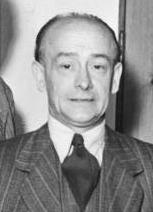Fritz Steinhoff
| Fritz Steinhoff | |
|---|---|

Steinhoff in 1949
|
|
| Minister President of North Rhine-Westphalia | |
|
In office 20 February 1956 – 21 July 1958 |
|
| Preceded by | Karl Arnold |
| Succeeded by | Franz Meyers |
| Constituency | Hagen |
| Member of the Bundestag for Hagen |
|
|
In office 1961–1969 |
|
| Preceded by | Luise Rehling |
| Succeeded by | Lothar Wrede |
| Personal details | |
| Born |
23 November 1897 Wickede, Dortmund |
| Died | 22 October 1969 (aged 71) |
| Political party | Social Democratic Party of Germany (SDP) |
Fritz Steinhoff (23 November 1897 – 22 October 1969) was a German politician of the SPD. He was the third Minister President of the state of North Rhine-Westphalia from 1956 until 1958.
Steinhoff was born in 1897 in a miner's family and grew up in Unna. He became a miner at the age of seventeen. Steinhoff was drafted into the Navy in 1917 and served on a torpedo boat until 1919. He returned to his job as a miner and joined the SPD. He belonged to a nationalistic section of the Young Socialists in the SPD. In 1922, he went to the European Academy of Work in the University of Frankfurt to hear lectures about business and politics from lectures such as Franz Oppenheimer. Due to unemployment, Steinhoff went to Berlin, where he worked and attended Deutsche Hochschule für Politik.
In 1926 he was a volunteer at the SPD party newspaper, Westfälische Allgemeine Volkszeitung (WAVZ), in Dortmund. A year later Steinhoff became managing director of newspaper distribution, and became the party secretary in Hagen. In the 1929 local elections, the SPD reached a majority, and Steinhoff was an honorary magistrate for Youth Sport Care and city gardening.
After the seizure of power by the Nazi Party, Steinhoff was arrested several times for vigorously opposing the party. He later worked at a stove and oven cleaning business from 1937 until his sentence in 1938, where Steinhoff was sentenced to three years in prison, due to smuggling the Vorwärts into Germany in 1934, after the banning of the newspaper in 1933.
He worked again as a laborer after his release in 1941. After the assassination attempt on 20 July 1944, Steinhoff was arrested again and was sent to the Sachsenhausen concentration camp. In 1945, Steinhoff was in a death march, being liberated by American troops in Mecklenburg.
After World War II, Steinhoff became a city councilor for Iserlohn. In 1946 he was the mayor of Hagen. Despite the CDU having a majority in the city council after the local elections, Steinhoff retained his office until 1956. He was a member of the first Landtag of North Rhine-Westphalia, of which he was the Minister of Reconstruction in the cabinet of Karl Arnold.
...
Wikipedia
